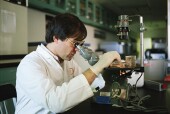T-Cell Duplication Delayed Up to 3 Days After Infection
Finding challenges conventional theory on how immune system responds to invaders.
|
E-mail this article
Subscribe to news
Printer friendly version
|

(SOURCE: Scripps Research Institute, news release, April 10, 2008)
FRIDAY, April 11 (HealthDay News) -- Immune system T-cells don't begin to multiply until up to three days after infection, an unexpected finding that changes current thinking about how the immune system responds to infection.
Researchers at the Scripps Research Institute in La Jolla, Calif., said this delay in T-cell proliferation may be an evolutionary safeguard against the risk of an autoimmune response caused by a sudden increase in T-cells.
It had been believed that memory T-cells (which recognize pathogens from previous infections) began to multiply much sooner than naive T-cells.
"It was thought that memory T-cells responded more effectively to infection by starting cell division earlier than naive cells and by multiplying more rapidly after that," Lindsay Whitton, a professor in the Department of Immunology and Microbial Science, said in a prepared statement. "Our study shows that neither assumption is true. Even though memory cells detected and responded to virus infection within a few hours, they did not begin to divide until after a lengthy delay. After that, cell division was rapid for both naive and memory cells."
Once proliferation of both types of cells started, there was a greater accumulation of memory T-cells, possibly because there were already more of them prior to infection, Whitton said.
The findings were published in April 10 online issue of the Public Library of Science Pathogens.
In this study, the Scripps team used laboratory animals to trace the proliferation of CD4 and CD8 memory T-cells. CD4 cells help regulate the immune system's response to pathogens such as bacteria and viruses, while CD8 cells attack infected cells and may be play a role in transplant rejection.
"The principal conclusions from our study are that, in a virus-infected animal, both naive and memory CD4 T-cells shows a similar and extended delay of approximately 72 hours before they begin to divide, and that this is true in both lymphoid and non-lymphoid tissues. This delay occurred despite the fact that the viral antigen reached T-cell-stimulatory levels within six to 12 hours after infection," Whitton said.
Whitton and his colleagues "were very much surprised by the discovery that memory cells didn't begin proliferation sooner than their naive counterparts. Memory T-cells are central to the protective immunity of infections and vaccinations, because they act against subsequent encounters with specific microorganisms. Compared to naive cells, memory T-cells can be triggered by lower antigen levels, and their initial response to infection, such as the production of cytokines, is more rapid and more effective."
More information
The Nemours Foundation has more about the immune system. 
Copyright © 2008 ScoutNews, LLC. All rights reserved. 
HealthDayNews articles are derived from various sources and do not reflect federal policy. healthfinder.gov does not endorse opinions, products, or services that may appear in news stories. For more information on health topics in the news, visit the healthfinder.gov health library.